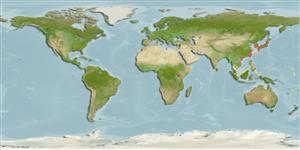分類 / Names
俗名 | 同種異名 | Catalog of Fishes(屬, 種) | ITIS | CoL | WoRMS | Cloffa
Teleostei >
Blenniiformes (Blennies)
鱸形目 (Blennies) >
Blenniidae (Combtooth blennies)
鳚科 (Combtooth blennies) > Salariinae
Etymology: Parablennius: Greek, para = the side of + Greek, blennios = mucus (Ref. 45335).
More on authors: Jordan & Snyder.
Environment: milieu / climate zone / depth range / distribution range
生態學
海洋 居於水底的; 海洋洄游的 (Ref. 51243). 溫帶
Northwest Pacific: southern Japan and Korea.
西北太平洋: 日本南部與韓國。
大小 / 重量 / 年齡
Maturity: Lm ? range ? - ? cm
Max length : 9.0 cm TL 雄魚/尚未辨別雌雄; (Ref. 56557)
背棘 (總數) : 12; 背的軟條 (總數) : 16 - 18; 臀棘: 2; 臀鰭軟條: 17 - 18. Gill opening wide, membranes broadly united and free from isthmus. Jaws with immovable teeth and a pair of canines posteriorly. Supraorbital cirrus present, longer in male. Body color extremely variable.
鰓裂廣闊地,薄膜寬廣地聯合了而且分離峽部。 在後部地頜部有固定的齒與一對犬齒。 眶上的卷鬚存在的, 更長的在雄魚中。 體色非常可變。
Facultative air-breathing in the genus (Ref. 126274); Adults are common in rocky shore areas. They feed on algae and detritus (Ref. 9137). Attain less than 9 cm TL. Oviparous. Eggs are demersal and adhesive (Ref. 205), and are attached to the substrate via a filamentous, adhesive pad or pedestal (Ref. 94114). Larvae are planktonic, often found in shallow, coastal waters (Ref. 94114).
常見於岩岸區域。 吃藻類與碎屑。 (參考文獻 9137) 全長少於 9 公分TL。
Life cycle and mating behavior
Maturities | 繁殖 | Spawnings | Egg(s) | Fecundities | 仔魚
Oviparous, distinct pairing (Ref. 205).西北太平洋: 日本南部與韓國。
Masuda, H., K. Amaoka, C. Araga, T. Uyeno and T. Yoshino, 1984. The fishes of the Japanese Archipelago. Vol. 1. Tokai University Press, Tokyo, Japan. 437 p. (text). (Ref. 559)
IUCN 瀕危狀態 (Ref. 130435)
無危 (LC) ; Date assessed: 04 February 2009
人類使用
工具
特別的報告
下載 XML
網路資源
Estimates based on models
Preferred temperature (Ref.
123201): 17.4 - 27.4, mean 22.6 °C (based on 256 cells).
Phylogenetic diversity index (Ref.
82804): PD
50 = 0.5000 [Uniqueness, from 0.5 = low to 2.0 = high].
Bayesian length-weight: a=0.01072 (0.00457 - 0.02514), b=3.01 (2.83 - 3.19), in cm total length, based on LWR estimates for this Genus-body shape (Ref.
93245).
營養階層 (Ref.
69278): 2.0 ±0.00 se; based on food items.
回復力 (Ref.
120179): 高度, 族群倍增時間少於 15個月 (Preliminary K or Fecundity.).
Fishing Vulnerability (Ref.
59153): Low vulnerability (10 of 100).
